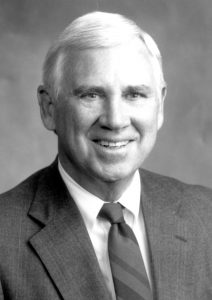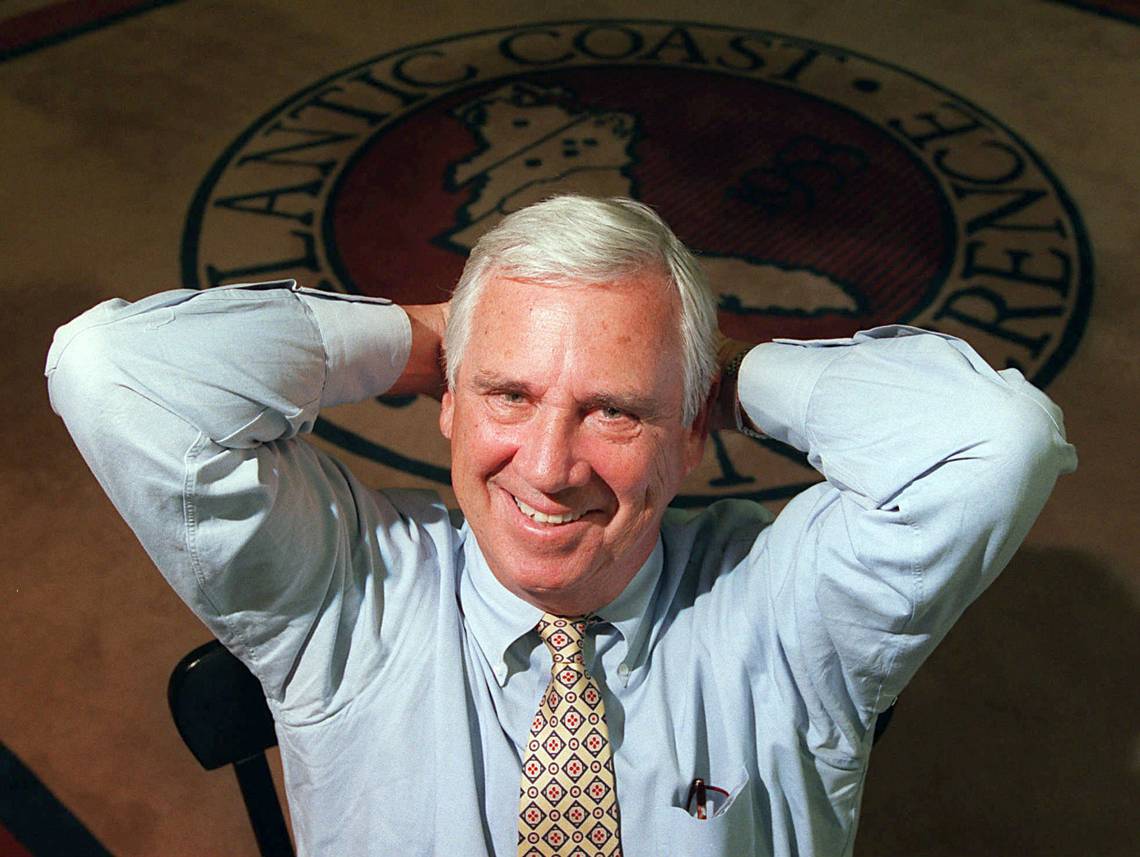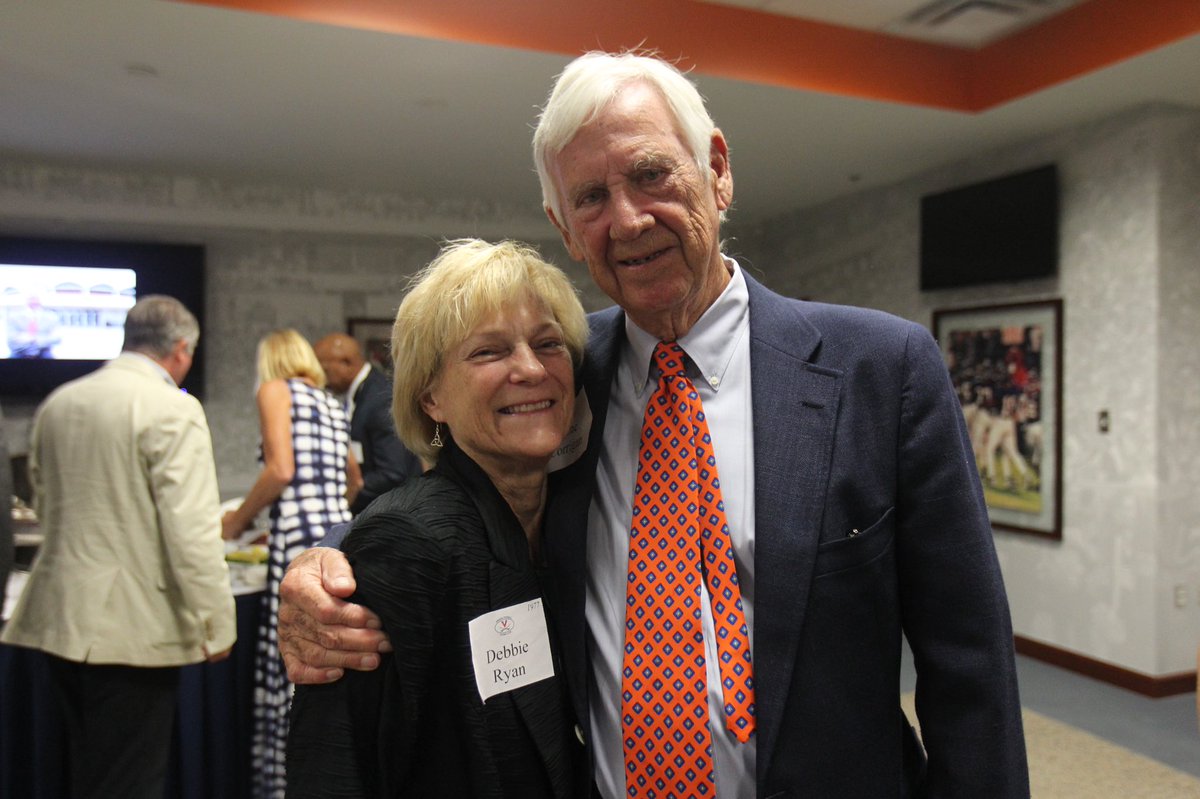EDITOR’S NOTE: This is the second in a multi-part series about the life and times of the late Gene Corrigan, focusing on his work as athletic director at Virginia and Notre Dame, and as commissioner of the ACC.
By Jerry Ratcliffe

Gene Corrigan was perfectly content as athletic director at Virginia until he received a phone call out of the blue in 1981.
On the other end of the line was Notre Dame president Father Edmund Joyce. He wanted Corrigan to become the next athletic director for the Fighting Irish.
Being a Catholic guy who grew up in Baltimore, Corrigan was intrigued even though he had never been to Notre Dame, didn’t know much about the place. After a lengthy conversation, Joyce asked Corrigan, “Are you going to do it?”
Corrigan paused and told Joyce that he had a wife and seven kids, and that such a move would be a major decision. Then there was the financial aspect to be weighed also.
Joyce asked how much Virginia was paying him and Corrigan replied $50,000. Joyce balked, saying, “We could never pay you anything like that here.”
Corrigan countered, “Father, the dance is over. I can’t move from Charlottesville to South Bend for less money.”
The haggling continued, with Joyce contending that it’s cheaper to live in Indiana, then asked again how much it would take. They settled on $55,000.
Virginia wasn’t going to surrender Corrigan without a fight. UVA president Frank Hereford wasn’t about to let his AD go and countered with an annuity, a $25,000 raise and a house near Scott Stadium that the university was going to give the Corrigans.
Once Lena Corrigan found out about the offer, her reaction was, “We’re rich! We’re going to have $100,000 in five years,” according to Gene. She wasn’t exactly pleased when she heard her husband’s reaction.
“I said, ‘I think we need to go out to Notre Dame,’” Gene Corrigan recalled, “and she said to me, ‘Are you crazy?’”
Eventually, Gene convinced her to make the move and he always felt like it was the best move he could have made for his family. He relished being the AD at Notre Dame and loved the challenge of restoring Irish football.
After 17 years of gridiron success under Ara Parseghian (11 years, 95-17-4), then Dan Devine (six years, 53-16-1), Father Joyce had unwisely hired Gerry Faust, a successful high-school coach from Ohio. Corrigan thought it was a terrible mistake because it was unfair for the program and its fans to put all that pressure on a high-school coach that wasn’t prepared for the challenge.
During Faust’s five years, assistant coaches were bailing out, Faust wanted to fire even more and bring in new guys. Players were coming into Corrigan’s office wanting to transfer.
Had it been solely up to Corrigan, he would have let Faust go.

Father Theodore Hesburgh, president of Notre Dame for 35 years, who ran the university along with Father Joyce, was not one to read the sports pages, but one columnist from Chicago caught his eye when the writer ripped Corrigan and the Irish football program.
Hesburgh called Corrigan and said, “Gene, you’re struggling with the Faust thing, aren’t you?”
Corrigan confirmed the notion. Hesburgh wanted to know everything and the AD explained every detail. Hesburgh said it appeared that Notre Dame had made a mistake, then asked how long Faust’s contract was.
“I said two more years, and [Hesburgh] replied, ‘Well, let’s put it this way — unless he dies, he’ll be here for two more years.’ Click,” Corrigan said. End of conversation.
“Well, it was a great lesson learned,” Corrigan said. “Everybody in our athletic department was thinking, like me, that [Faust] was killing us, that he’s not going to get it done.”
What Corrigan — with his people and leadership skills — accomplished was getting the rest of the department to realize that Faust was going to be around for another two years, like it or not, so they had better make the best of things.
“What are we going to do, sit around here and bitch and moan? Or are we going to back him and do everything we can to help him win?” Corrigan said.
The next two years weren’t much better, but at least he had support. When the time came, Faust stepped down.
Meanwhile, Corrigan received the blessing of Joyce and Hesburgh to hire whomever he wanted. Corrigan didn’t blink. He had always wanted Lou Holtz. He had tried to hire Holtz a couple of times before, but the timing was bad.
Holtz wanted to come to South Bend. It was his dream job. It was a match made in heaven.
Corrigan went to see Holtz, who was the head coach at Minnesota at the time, and realized quickly that Notre Dame was essentially the only job in the world Holtz really wanted. One thing that Corrigan wanted to make clear was the conditions coaches had to live with at the Golden Dome, so he brought a list to Holtz.
“I had learned over the years that when you hire somebody, you’ve got to tell them everything that’s wrong because I guarantee they’ll find those things the first month they’re on the job and they’ll be on your back saying, ‘Why didn’t you tell me this?’”
The list Corrigan showed to Holtz was specific: No transfers. No athletic dorm. No training table. No this, no that.
With his best Holtz impression, Corrigan muttered Lou’s reaction: “‘Oh, this is great, the way it should be everywhere.’”
“One thing people don’t understand about Notre Dame,” Corrigan said. “It’s more like the U.S. Naval Academy than UVA. Ninety percent of everybody lives on campus and eats in one of two dining halls. They have an allegiance for each other.”
That was 1986 when Holtz came to Notre Dame and after the Irish started 1-3, some close games against good competition, and Holtz barged into Corrigan’s office one day and said something like, “You know that list you showed me? It’s all crap. If we don’t get some transfers in here it’s gonna take 20 years to turn this thing around.”
Corrigan stood his ground and asked Holtz how many national championships he had won. They both knew that Holtz had not won any. Corrigan informed his football coach that Notre Dame had won numerous national championships before he arrived.
“Get out of my office and go back to work,” Corrigan barked.
Holtz stormed out, slammed the door behind him. Five minutes later, he came back in, poked his head in and said, “Dammit, we’ll get it done anyway.”
Holtz did. The Irish won the national championship in 1988 and were in contention in ‘89.
Corrigan wasn’t there to see it because an old friend came a-callin’. The ACC needed a new leader and everyone knew it had to be Corrigan.
(NEXT: Corrigan comes home as ‘The Commish’ of the ACC)


